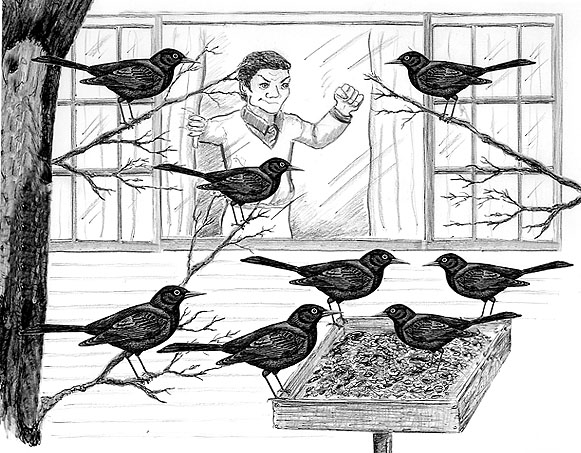
Dear Bird Folks,
We often tap on our windowpanes in order to shoo the grackles away from our feeders. That usually works and we haven’t broken any glass yet. However, sometimes the grackles leave before we start tapping. Do they see us coming or do they hear us? How good is their hearing? It can’t be very good because I’ve never noticed any ears on them.
– Bill, Stamford, CT
Before I begin, Bill,
I might suggest that you invest in a grackle-proof birdfeeder. I know that jumping up, running across the room and tapping on the window might be a great source of entertainment, especially there in Stamford. But despite your string of luck, you are an accident waiting to happen. Every spring, after the grackles return, the tapping starts and the windows shatter. This time of year it seems half of my customers are walking around with bandaged hands. Some days my shop looks like the battle scene from Gone With the Wind. Forget the tapping.
I’m not surprised that you have never noticed grackles’ ears. That’s because they don’t have any, or at least any you can easily see. Birds are smart; they keep their ears hidden. They know ears are silly looking. Check in the mirror sometime and you’ll see what I’m talking about. Our ears look deformed, like a pair of mutated apricots that have somehow dried onto the sides of our heads. Birds have no use for that look. The other reason birds keep their ears covered might have to do with aerodynamics. The sleeker their bodies are, the less wind resistance they have. Big, floppy ears would not be an asset in flight, except perhaps in the case of Dumbo.
Internally birds’ ears are somewhat similar to ours, but externally they are nothing but holes in the sides of their heads. The holes are covered with feathers to keep out the elements or any stray spitballs. While feathers typically have little barbules to hold them together, ear feathers don’t have the barbules. This gives the ears protection while still letting the sound to pass through.
With only holes for ears you might wonder whether birds have good hearing. Well, yes, kind of, sort of, maybe. On average birds’ hearing is okay, but their range isn’t anything special, not even as wide as ours is. Birds typically are good at hearing the sounds that are important to them; i.e., their prey and other birds of their species. Cooing pigeons and doves specialize in hearing low tones, but the tradeoff is they don’t hear higher pitched sounds very well. The squeaky little songbirds are better at hearing higher pitched sounds, but many aren’t able to hear lower tones, which explains why you see so few songbirds watching James Earl Jones movies.
While some birds’ hearing range may be limited, their little chickpea-sized brain is somehow able to process more of what they hear. Two male Yellow Warblers might sound identical to us, but a female warbler can easily sort out the minute differences in the two songs and immediately knows which would be the better mate. Having a good voice is sometimes better than having good looks. Just ask Lyle Lovett.
Not only is a bird’s hearing ability different from species to species, but also the ears themselves are not all the same. Owl ears are asymmetrical. One ear is set higher in the skull than the other one. (I think I have a cousin like that.) This odd formation allows the nocturnal hunter to find prey by sound as well as sight. Sound waves hit each ear at a slightly different time, which lets the bird pinpoint exactly where the sound comes from. Some deep diving birds have a weird flap of skin that will cover their ear hole to keep out the water. (Gee, I wonder if my cousin has one of those, too.)
I’m not surprised that your grackles take off, even before you start tapping. As birds go, grackles are a paranoid lot. They always seem to be on edge, bursting into flight at the slightest change in their surroundings. Perhaps years of being tapped at has done this to them. Either that or they need to switch to decaf. I think your birds’ reaction is a combination of things. They could be visually noticing your motion as you march towards the window. They could be hearing your footsteps or the sound your La-Z-Boy makes when you pop out of it. They also could be feeling your vibes. Have you ever knocked on a neighbor’s front door and “felt” someone coming before they get to the door? The birds could be picking up the same vibrations. It’s just a theory.
Even without noticeable ears, Bill, birds have good hearing. And it’s lucky for them that they do because if they had to read lips, they would be in big trouble. (You see, birds don’t have lips…in case you didn’t get that last line.) Instead of banging on the window, I suggest you invest in a grackle-proof feeder. A grackle-proof feeder is basically a wire cage wrapped around a regular feeder. They’re kind of ugly, but they work. The smaller birds are able fly right through the wire while the grackles are left on the outside, cursing at you. Don’t let the cursing get to you though. It happens to me everyday.